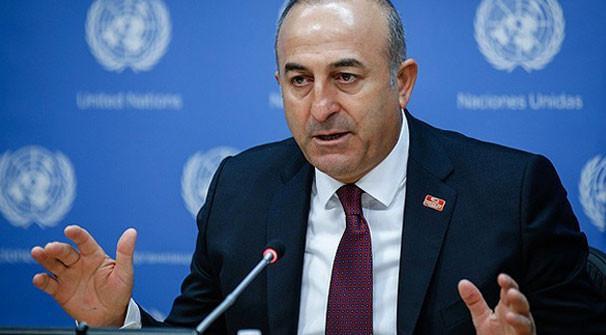
Foreign Minister Mevlüt Çavuşoğlu is visiting Russia to participate in a meeting of the Joint Strategic Planning Group, which is a sub-organ of the Turkish-Russian High-Level Cooperation Council. The countries’ leading diplomats are expected to focus on the Syria issue during the talks.
Çavuşoğlu is set to meet with Russian Foreign Minister Sergey Lavrov in Moscow on March 14. In addition to discussing Syria, the ministers will make preparations for an upcoming high-level Russian-Turkish Cooperation Council meeting, which is scheduled for April 3.
Under the framework of the council, the two countries’s bilateral relations are discussed once a year with the attendance of the two countries’ presidents and ministers, hosted by Ankara and Moscow by turns.
During his visit to Moscow on March 14-16, Çavuşoğlu will pay a visit to the Moscow International Travel & Tourism Exhibition (MITT), deliver a speech on “Turkish foreign policy” at the MGIMO University and meet with chief editors of the prominent Russian media.
“The parties will focus particular attention on the fight against international terrorism, efforts to stabilize the situation in Syria and ways to find a political solution in light of the results of the Syrian National Dialogue Congress in Sochi,” Russian Foreign Ministry spokeswoman Maria Zakharova said last week.
Syria accounts for one of the most important issues in Turkish-Russian cooperation. On March 16, with the participation of Iranian Foreign Minister Javad Zarif, three ministers will convene a meeting in Astana to discuss progress over peace efforts for Syria and preparations for a trilateral summit for the leaders of the guarantor countries Turkey, Russia and Iran.
Another meeting at the technical level is set to take place in the city the day before the foreign ministers’ meeting to discuss the release of detainees, the handing over of the deceased and the search for the lost. The Syrian regime’s heavy air strikes and clashes in the Syrian rebel enclave of Eastern Ghouta is a concern for Ankara. Eastern Ghouta is one of four “de-escalation” zones that were devised in order to keep the rebel and regime forces at arm’s length as part of a plan thrashed out in Astana last year.
Separately, Çavuşoğlu is scheduled to meet with his U.S. counterpart Rex Tillerson on March 19 in Washington, where the two diplomats are expected to discuss the Syrian Kurdish People’s Protection Units (YPG) presence in Syria’s Manbij, a major rift between the two NATO allies. Ankara says it will stage an operation on the Syrian town if the YPG, which it sees as a terrorist group, does not pull out.
The summit is planned for early April, possibly April 4, though a recent statement from the Iranian side has mentioned May as a date for the gathering.
In bilateral relations, Ankara and Moscow are still in the process of normalization after Turkey shot down a Russian jet near the Syrian border in 2015. Nevertheless, two countries have not returned to pre-crisis levels regarding the problems Turkish businessmen operating in Russia were facing over the sale of agricultural products, as well as visa problems.
Russia is still unwilling to lift visa requirements for Turkish citizens on the grounds of terror threats posed by the Islamic State of Iraq and the Levant (ISIL).
Russia banned Turkish tomato imports after the downing of its war plane in 2015. The ban remained in effect until Dec. 1, 2016, when Russia allowed 50,000 Turkish tomatoes to be imported from four Turkish producers as part of a rapprochement deal.
In the defense industry, Turkey and Russia signed an agreement for a loan of the purchase of Russian S-400 anti-missile defense systems.
The two countries also sealed an energy partnership between Russia’s national nuclear energy corporation Rosatom and the Turkish consortium Cengiz-Kolin-Kalyon (CKK) over the Akkuyu Nuclear Power Plant. The parties are still trying to clear obstacles that impede the Akkuyu project as they seek the necessary permissions and partnership stricture. Kolin and Kalyon decided to pull out of the project after studying the deal in detail. Rosatom has said they are engaged in talks that aim to bring in Turkish state electricity producer EÜAŞ as a new shareholder in the project.